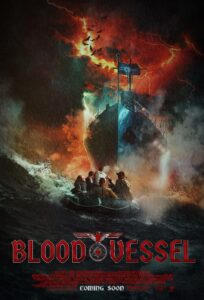
Man, I gotta go back and rewatch this movie, Blood Vessel.
It should have been much better than it was.
Whenever I experience this, my writer brain always asks, “why?” Why, with good elements in place, does a movie or story fall flat.
I know there’s quite a few spots where they dropped the ball–not all in the writing department mind you– but one thing jumped out at me that I’ve seen from a lot of newer writers. It’s a little bit deceptive, so I figured it was worth a post to call it out and help y’all avoid this at all costs.
This movie, set against WW2, starts off with a riff-raff group of survivors drifting in a life raft. There’s a nurse, a Russian soldier, an Australian merchant captain, a squirrely British code breaker nerd, a greasy American soldier, and a tank-archetype mechanic.
(I may be getting some of these wrong, I’m going from memory here, but that’s the jist of it.)
Ok, so this group finds their way onto an “abandoned” Nazi ship, which of course is loaded with treasure… and Vampires.
Good stuff.
I’m not here for spoilers.
What I want to point out is that when they fully realize what’s going on, that there are actually deadly vampires on the boat killing everyone, they decide “they can’t let the vampires get off the boat.”
Honestly, now that I think of it, wouldn’t the best course of action been to send the boat back to the Nazis? I mean what better way to win the war then throw some angry, hungry vampires at them.
But I digress.
There’s a big narrative problem with the group’s choice to try and defeat the vampires. Can you already guess what it is based on the simple synopsis I’ve given?
Trying to defeat a group of vampires is seriously dangerous work. Work that will likely get you killed. The sacrificial work of heroes.
If you go back to the cast of survivors boarding the Nazi ship, you’ll notice none of them are heroes. I called them a riff-raff. A kind of discombobulated assortment of WW2 personas. These are characters that primarily, showed concern for their own welfare, or at least, welfare of the group.
None of these characters had as part of the arc, or core character development, an altruistic goal of winning the war on account of the Allies. Obviously, as low-ranking members of the Allies, none of them wanted the Nazis to win, but none of them were significant cogs in the war to really have any larger bearing on the outcome.
The writer of the movie, superimposed his own narrative goal, rather than letting the character’s natural established goals take priority. Basically, the writer wrote himself into a corner, “Shit, now that they know there are Vampires on the ship, how do I get them to fight each other? I know, I’ll make them decide they’re obligated to do it! Good people can’t let Vampires out in the world!”
It would have been far more convincing AND engaging, if the cast of characters had said, “Bloody hell to Vampires, let’s get the hell out of here,” and the Vampires brought the fight to them.
When writing, never supersede your character’s goals. Of course, goals CAN change, but NEVER have them change out of character. And changes must arrive through plausible causality.
(I’ve spoken about plausible causality at more length elsewhere.)
If the writer of Blood Vessel had put a little more thought onto this point, he could have easily adapted–at least one of–the characters to fit his intended goal of stopping the Vampires at all costs.
One way he could have done it, is by making one of the Allied cast, a high-ranking officer. A high ranking officer, actually influential in the war, might certainly make the command decision that new threats, “like Nazi vampires,” are an unacceptable risk to the Allies. OR, perhaps the writer could have established the Nazi ship itself as some sort of high value target for the Allies.
Creating a need for the Allies to salvage the ship, would have created a goal of purging it of Vampires beforehand.
Hopefully this example stand as a clear reminder to keep your character goals in line with… well, the characters. Fudging goals is a sure-fire way to disengage your readers and ruin the potential of your story.
BONUS Alien Argument
While writing this post my brain reminded me of AlieN and AlienS.
BRAIN
Hey Nick, what about Alien(s), didn’t a riff-raff kind of group decide the same thing? To take out the baddie aliens so they couldn’t get back to Earth?
NICK
Not so fast! It’s not always about you, cheese!
(nevermind.)
If I remember correctly, in AlieN, they weren’t actually trying to kill it to save the greater good… Really, they were just trying to survive it. And why shouldn’t they, they were just blue collar workers. Not soldiers. Not trained to engage xenomorphs. Not equipped to engage xenomorphs.
You might even argue the crew’s employer was responsible, leaving them completely vulnerable to such a threat… and at the end of the day, however it panned out, it was THEIR responsibility to clean it up.
In Alien(s), things are a bit different.
First, they are trained soldiers.
Second, the narrative develops greater stakes that a colony had been established and the aliens were purposefully introduced to the colony.
Third, the narrative further develops that one of their members is tasked to bring back one of the aliens for actual weapon research.
These all establish plausible causality that Ripley and the others can’t simply survive the situation, but instead have to actively beat the situation. ▪
About the Author —
If you enjoy this article, please share the direct link on your social media.
Newcomer or veteran writer, if you’re working on a project that needs commercial success, Nick urges to you read this intro article.
Nick Macari is a full-time freelance story consultant, developmental editor and writer, working primarily in the independent gaming and comic markets. His first published comic appeared on shelves via Diamond in the late 90’s. Today you can find his comic work on comixology, Amazon, and in select stores around the U.S.
